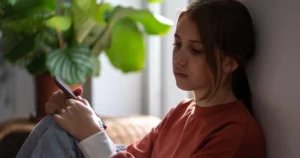Sexting resources
See a list of resources, organisations and helplines that you can use to help support your child and deal with any concerns you may have about sexting.
Useful resources
Here are a number or organisations and helpline that can offer one-to-one support for you and your child.
- NSPCC – Tips on how to help children to be share aware
- CEOP – Report inappropriate content to protect children from abuse
- IWF – Report child sexual images to IWF
- ThinkUKnow – Advice to deal with a child sharing a nude
- YoungMinds – Speak to trained advisers to support your child
- Parents Protect! – Call helpline for one-to-one support – 0808 1000 900
If your child cannot talk to you about their concerns, advise them to use these services to talk or connect with a trained counsellor to help them deal with their issue.
Learn how to set privacy settings, report inappropriate content and check the minimum age on the most popular social media apps to keep your child safe on social.
- NSPCC – Net Aware apps guide
- Facebook – Bullying & harassment resources
- Gaming consoles – Social networking gaming apps
Should your child need extra support, counselling or mentoring to cope with a bullying issue then these organisations may be able to provide advice and services.
- Childline – Counselling services for children
- Counselling Directory – A nationwide counselling directory service
- Mental Health Fundation – How to talk about mental health with your GP
Featured sexting articles
 Research
Research
Preventing ‘self-generated’ child sexual abuse
This report explores effective methods to prevent the sharing of 'self-generated' child sexual abuse material among pre-teens.
 News & blogs
News & blogs
What is undress AI? Guidance for parents and carers
Artificial intelligence continues to increase in ability and technology. Undress AI is one example that could leave young people open to harm.
 Expert opinion
Expert opinion
How schools tackle sexual image-sharing among pupils: Insights from a teacher
Dr. Tamasine Preece shares her experience of sexual image-sharing among pupils in schools.
 Research
Research
Teen girls’ experiences of harm online
Our latest Digital Wellbeing Index report shows that teen girls experience significantly more negative outcomes online than other children.
 Research
Research
Internet Matters x Nominet research: Methods to prevent the spread of self-generated CSAM
In this blog we share findings from Round 2 of our research into the prevention of sexual image-sharing among 11-13-year-olds.

